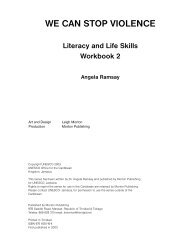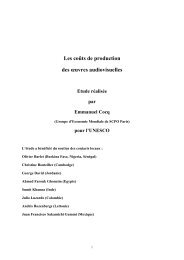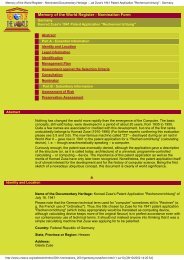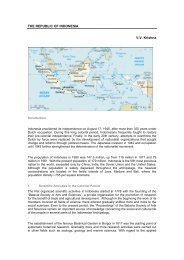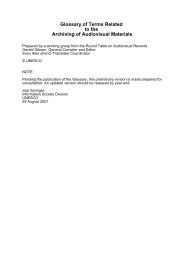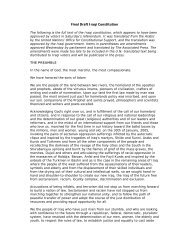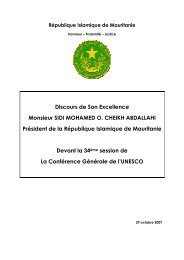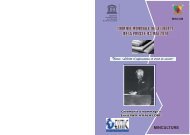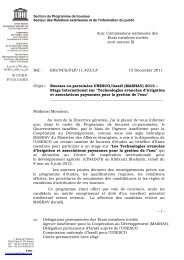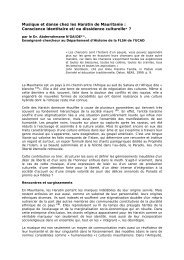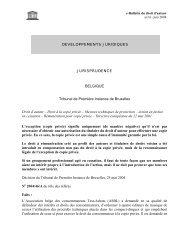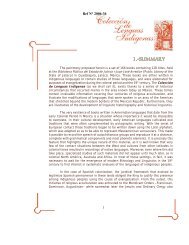Accepted Papers - 3.pdf - UNESCO
Accepted Papers - 3.pdf - UNESCO
Accepted Papers - 3.pdf - UNESCO
Create successful ePaper yourself
Turn your PDF publications into a flip-book with our unique Google optimized e-Paper software.
National Seminar on Rainwater Harvesting and Water Management 11-12 Nov. 2006, Nagpur<br />
73. A Case Study on Wastewater Treatment and<br />
Reuse of Waste Water<br />
INTRODUCTION<br />
Water is the nature’s gift and is available in<br />
various forms. Its use is universal. Pure water is<br />
never found in nature. Water available in the earth<br />
surface contains number of impurities such as<br />
organic, inorganic and various gases which may be<br />
harmful to the health of the public. Therefore it is<br />
very essential to remove such impurities so that<br />
water will be potable.<br />
Waste is anything discarded, rejected,<br />
surplused, abandoned or otherwise released into the<br />
environment that could have an impact on the<br />
environment. Waste affects our world’s<br />
environment, everything that surrounds us including<br />
air, water, land, plants and man made things. The<br />
waste, created has to be carefully controlled so that<br />
it does not harm our environment. Hence the effect<br />
of waste onto the environment can be controlled by<br />
practicing three R’s viz. Reduce, Recycle and Reuse.<br />
REDUCE<br />
Reduce or reduction is to make something<br />
smaller or useless, resulting in a smaller amount of<br />
waste. Source reduction is reducing waste which<br />
indicates conservation of natural resources wisely<br />
and using less than usual in order to avoid waste.<br />
RECYCLE<br />
Recycling denotes the process that would<br />
make waste into resource. Water can be recycled<br />
well. Water recycling is reusing the treated<br />
wastewater for beneficial purpose such as<br />
agriculture, landscape irrigation, industrial<br />
processes, toilet flushing and replenishing a ground<br />
*Mr. V. Karthikeyan **Mr. P. Venugopal<br />
water basin ( ground water recharge )<br />
BENEFITS OF RECYCLING<br />
• Water recycling can decrease diversion of fresh<br />
water from sensitive ecosystems.<br />
• Water recycling decreases discharge to sensitive<br />
water bodies.<br />
• Recycled water may be used to create or<br />
enhance wetlands and riparian habitats.<br />
• Water recycling can reduce and prevent<br />
pollution.<br />
REUSE<br />
Reuse is the process of repairing or giving<br />
it to someone who can repair. Reusing product, when<br />
possible, is even better than recycling because the<br />
item does not need to be reprocessed before it can<br />
be reused.<br />
BENEFITS OF RECYCLED WATER<br />
Recycled water can satisfy most water<br />
demands, as long as it is adequately to ensure water<br />
quality appropriate for use. Recycled water is most<br />
commonly used for the purposes such as agriculture,<br />
landscape, public parks and golf course irrigation.<br />
Also it includes cooling water for power plants and<br />
oil refineries, industrial process water for such<br />
facilities as paper mill and carpet dyers, toilet<br />
flushing, dust control, construction activities,<br />
concrete mixing and artificial lakes. In ground water<br />
recharge projects, recycled water can be spread or<br />
injected into ground water aquifers to augment<br />
ground water supplies, and to prevent water<br />
intrusion in coastal areas.<br />
* Head of Civil Engg. Dept., Thiagarajar Polytechnic College, Salem & Hon. Secretary,<br />
Institutions of Engineers (India), Salem Local Centre<br />
**Lecturer in Civil Engg. Dept., Thiagarajar Polytechnic College, Salem<br />
402



